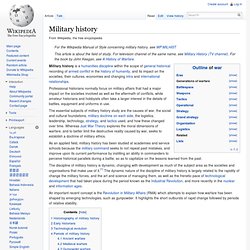

Military history. Military history is a humanities discipline within the scope of general historical recording of armed conflict in the history of humanity, and its impact on the societies, their cultures, economies and changing intra and international relationships.

Professional historians normally focus on military affairs that had a major impact on the societies involved as well as the aftermath of conflicts, while amateur historians and hobbyists often take a larger interest in the details of battles, equipment and uniforms in use. The essential subjects of military history study are the causes of war, the social and cultural foundations, military doctrine on each side, the logistics, leadership, technology, strategy, and tactics used, and how these changed over time. Whereas Just War Theory explores the moral dimensions of warfare, and to better limit the destructive reality caused by war, seeks to establish a doctrine of military ethics. Historiography of military history[edit] Early historians[edit] Anthropology.net. Biological anthropology.
Primate skulls: Human, Chimpanzee, Orangutan, Macaque Biological anthropology, also known as physical anthropology, is a scientific discipline in which research is concerned with the biological and behavioral variation of human beings, other non-human primates, and extinct hominin ancestors of the human species.[1] It is a subfield of the broader discipline of anthropology, and it provides a biological perspective to the systematic study of human variation. Branches[edit] As a subfield of anthropology, biological anthropology itself is further divided into several branches. All branches are united in their common application of evolutionary theory to understanding human morphology and behavior.